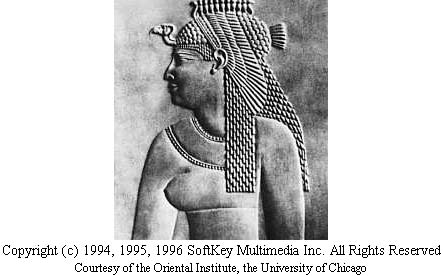|
|
|
Amazon.com International Sites :
USA, United Kingdom, Germany, France
Books about Cleopatra :
Cleopatra VII : Daughter of the Nile (Royal Diaries)
(69-30 BC). One of the most fascinating women of all time was Cleopatra VII, queen of Egypt. She had great intelligence and beauty, and she used both to further Egypt's political aims.

A sculpture of Cleopatra was done in bas-relief at the Temple of Hathor in Dandarah, Egypt. --Courtesy of the Oriental Institute, the University of Chicago
Cleopatra was of Greek heritage and culture, one of the Ptolemy line set on the throne of Egypt after the conquest
of Alexander the Great (see Alexander the Great). Her father, Ptolemy XII, named her
and his elder son, Ptolemy, joint rulers. Cleopatra came to the throne in 51 BC. Three years later young Ptolemy's
supporters had Cleopatra driven into exile.
In 48 BC Caesar appeared in Egypt in pursuit of his rival, Pompey. When Cleopatra heard that Caesar was in the
palace in Alexandria, she had one of her attendants carry her to him, rolled up in a rug offered as a gift. Captivated
by her charm, the 52-year-old Roman helped her regain her throne. Ptolemy XIII was drowned, and Caesar made Cleopatra's
younger brother, Ptolemy XIV, joint ruler with her. (See also Caesar; Pompey
the Great.)
Cleopatra bore Caesar a son, called Caesarion, meaning "little Caesar." When Caesar returned to Rome,
she followed him with their baby and lived in Caesar's villa, where he visited her constantly. After Caesar was
assassinated in 44 BC, Cleopatra returned to Egypt. Soon after, Ptolemy XIV died, perhaps poisoned by Cleopatra,
and the queen named her son Caesarion co-ruler with her as Ptolemy Caesar.
Civil war followed Caesar's assassination, and the Roman Empire was divided. Mark Antony, as ruler of the eastern
empire, summoned Cleopatra to Tarsus, in Asia Minor, to answer charges that she had aided his enemies (see Antony).
The queen arrived, dressed as Venus, on a magnificent river barge. She welcomed Antony with feasting and entertainment.
Fascinated by her, he followed her to Alexandria.
After a festive winter with Cleopatra, Antony returned to Rome. He married Octavia, sister of Octavian (later called
Augustus), though he still loved Cleopatra, who had borne him twins. When he went east again, in an expedition
against the Parthians, he sent for her and they were married.
Octavian was furious and declared war on Cleopatra (see Augustus). Antony and Cleopatra
assembled 500 ships. Octavian blockaded them off the west coast of Greece, and the famous 31 BC battle of Actium
followed. Cleopatra slipped through the blockade and Antony followed her, but his fleet surrendered.
The next year Octavian reached Alexandria and again defeated Antony. Cleopatra took refuge in the mausoleum she
had had built for herself. Antony, informed that Cleopatra was dead, stabbed himself. Soon another messenger arrived,
saying Cleopatra still lived. Antony insisted on being carried to her and died in her arms. Later Cleopatra committed
suicide--tradition says by the bite of a poisonous asp.
Amazon.com International Sites :